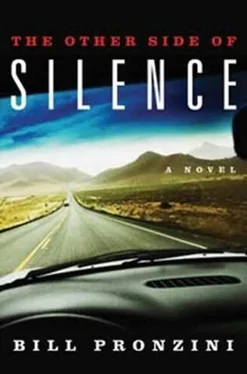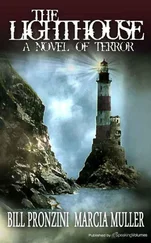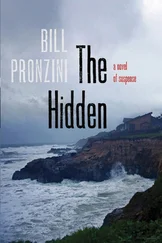
Bill Pronzini
The Other Side Of Silence
© 2008
If we had a keen vision and feeling of all ordinary human life, it would be like hearing the grass grow and the squirrel’s heart beat, and we should die of that roar which lies on the other side of silence.
– George Eliot
WHEN GEENA FINALLY LEFT him and filed for divorce, Fallon put the Encino house up for sale and took his last two weeks of vacation from Unidyne. Then he loaded the Jeep Liberty and drove straight to Death Valley.
Will Rodriguez was the only person he told where he was going. There was nobody else to tell, really. He had no close friends except for Will, and theirs was mostly a work-related friendship; and Timmy was three years gone now and his folks both dead, too. Geena could have guessed, of course. She knew him that well, though not nearly well enough to understand his reasons. She’d think the same thing she always did when he went to the desert. And she’d be wrong.
October was one of the Valley’s best months. All months in the Monument were good, even July and August when the midday temperatures sometimes exceeded 120 degrees and Death Valley justified its Paiute Indian name, Tomesha -ground afire. If a sere desert climate held no terrors for you, if you respected it and accepted it on its terms, the attractions far outweighed the drawbacks.
Still, he’d always been partial to October, the early part of the month, so in that sense Geena’s timing couldn’t have been better. The beginning of the tourist season was still a month away, daytime temperatures seldom reached 100 degrees, and the constantly changing light show created by sun and wind and clouds was at its most spectacular. You could stay in one place all day, from dawn to dusk-Zabriskie Point, say, or the sand dunes near Stovepipe Wells-and with each ten-degree rise and fall of the sun, the colors of rock and sand hills changed from dark rose to burnished gold, from chocolate brown to purple and indigo and gray-black, with a spectrum of subtler shades in between.
It had been almost a year since he’d last been to the Valley. Much too long, but it had been a difficult year-the still-painful memories and the dying marriage and a heavy workload at Unidyne. He’d been alone on that last visit, as he was alone now; alone on the last dozen or so desert trips. Even before Timmy’s death, Geena had refused to come with him anymore. She’d never much cared for desert country, actively disliked Death Valley, and she’d used Timmy as an excuse: he was too young, there were too many hazards, he was better off at home with her. After the accident, she hadn’t needed an excuse anymore.
Well, he preferred being alone. Had always had loner tendencies, even during his stint in the army and the good early years with Geena before and after Timmy was born. The Valley was a place made for loners. You could share it only with someone who viewed it in the same perspective-not as endless miles of coarse, dead landscape but as a starkly beautiful wilderness teeming with life. To him it seemed almost sentient, as if deep within its ancient rock was something that approximated a soul.
He’d taken his time deciding where to go first on this trip. The Monument had more than three thousand square miles, second only among national parks to Yellowstone, and all sorts of terrain: the great trough of the Valley floor, with its miles of salt pan two hundred feet and more below sea level, its dunes and alluvial fans, its borate deposits and ancient borax works, its barren fields of gravel and broken rock, its five enclosing mountain ranges packed with hidden canyons, petroglyphs, played-out gold and silver mines, ghost towns.
Most of an evening had been spent with his topos, the topographical maps put out by the U.S. Geological Survey, before he finally settled on the Funeral Mountains and the Chloride Cliffs area. The Funerals formed one of the eastern boundaries, and their foothills and crests were laden not only with a variety of canyons but with the ruins of the Keane Wonder Mill and Mine and the gold boomtown of Chloride City.
He left the Jeep north of Scotty’s Castle near Hells Gate, packed in, and stayed for three days and two nights. The first day was a little rough; even though regular gym workouts had kept him in good shape, it takes a while to refamiliarize yourself with desert mountain terrain after a year away. The second day was easier. He spent that one exploring Echo Canyon, then tramping among the thick-timbered tramways of the Keane and the decaying mill a mile below, where twenty stamps had processed eighteen hundred tons of ore a month in the 1890s. On the third day he climbed to the Funerals’ sheer heights and Chloride City-no strain at all by then.
It was a good three days. He saw no other people except at a distance. Much of the tension and restless dissatisfaction slowly bled out of him. He could feel his spirits lifting again.
Geena was on his mind only once in those three days. Eleven years of marriage, all they’d shared and suffered through, and now she seemed almost a stranger. He didn’t blame her for the long-running affair she’d finally admitted to, or leaving him to be with the other man; he hadn’t been there for her, any more than she’d been there for him, in three long years. Maybe things would have been different if they’d had another child, but she wouldn’t consider it, kept insisting she couldn’t bear another loss after Timmy and the earlier miscarriage. There was a time when he’d thought so, but that was long past. The simple truth was, their life together had died when Timmy died. Now that they’d finally admitted it to each other, the only emotions he felt, and was sure she felt, were sadness and relief.
It was the morning of the third day, as he stood atop one of the crags looking out toward the Needle’s Eye, when he thought of her. There was no wind and the stillness, the utter absence of sound, was so acute it created an almost painful pressure against the eardrums. Of all the things Geena hated about Death Valley, its silence-“void of silence,” an early explorer had termed it-topped the list. It terrified her. On their last trip together, when she’d caught him listening, she’d said, “What are you listening to ? There’s nothing to hear in this godforsaken place. It’s as if everything has shut down. Not just here-everywhere. As if all the engines have quit working.”
Right. Exactly right. As if all the engines have quit working.
That, more than anything else, summed up the differences between them. To her, the good things in life, the essence of life itself, were people, cities, constant scurrying activity. She worshipped sensation and speed, needed to hear the steady, throbbing engines of civilization in order to feel safe, secure, alive.
He needed none of those things, needed not to hear the engines. Silence was what he craved. This kind of silence, nurturing, spiritual, that let him feel as he felt nowhere else, at ease with himself and his surroundings. It was the other kinds he hated, the cold, hurtful, destructive kind-the long, loud silences of a shattered marriage, the empty silence of a child’s grave. They were worse than the thunder of engines.
He remembered something else Geena had said to him once, not so long ago. “When we were first together you were a fighter, Rick, a soldier in and out of uniform. You welcomed challenges, you faced problems and responsibilities head-on. But after Timmy died you just seemed to give up. Now all you want to do is run away and hide from the world.”
Читать дальше













